2023年中考英语复习 七年级(下) Units 1-4 课件(共37张PPT)
文档属性
| 名称 | 2023年中考英语复习 七年级(下) Units 1-4 课件(共37张PPT) |  | |
| 格式 | ppt | ||
| 文件大小 | 2.2MB | ||
| 资源类型 | 教案 | ||
| 版本资源 | 人教新目标(Go for it)版 | ||
| 科目 | 英语 | ||
| 更新时间 | 2023-06-11 15:14:06 | ||
图片预览

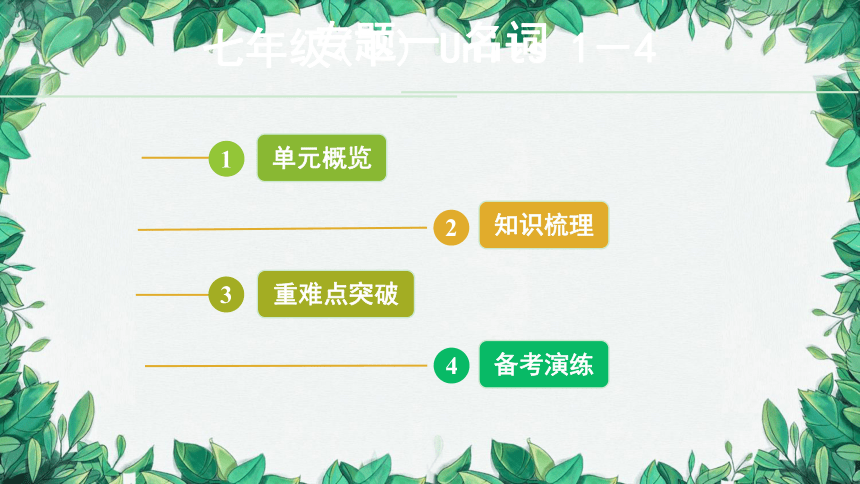
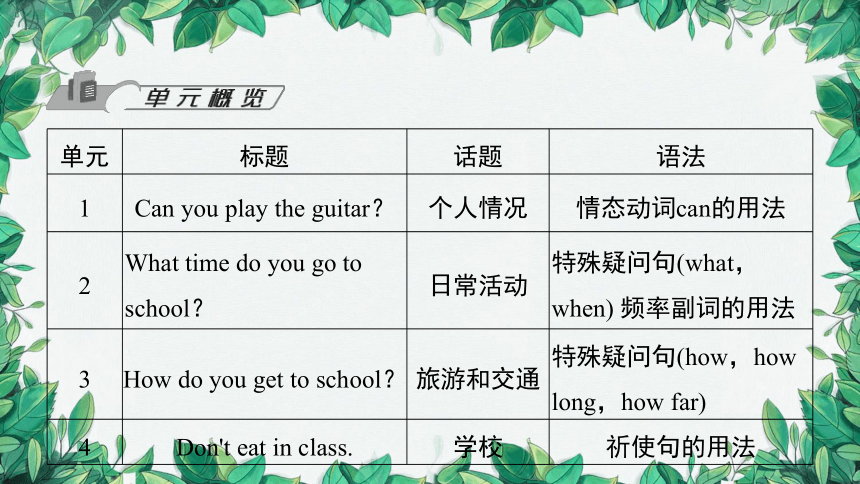
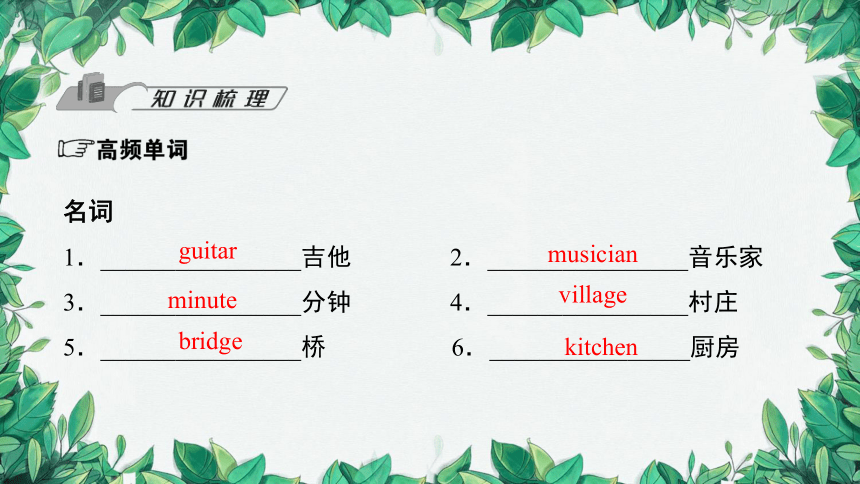
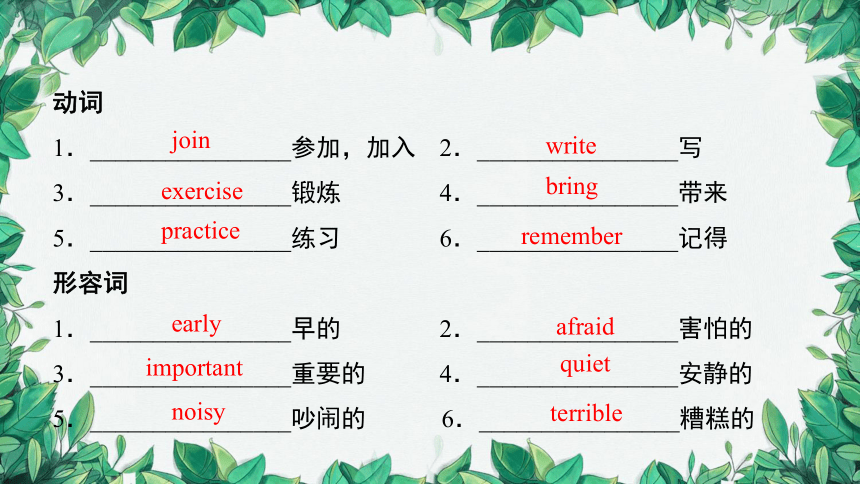
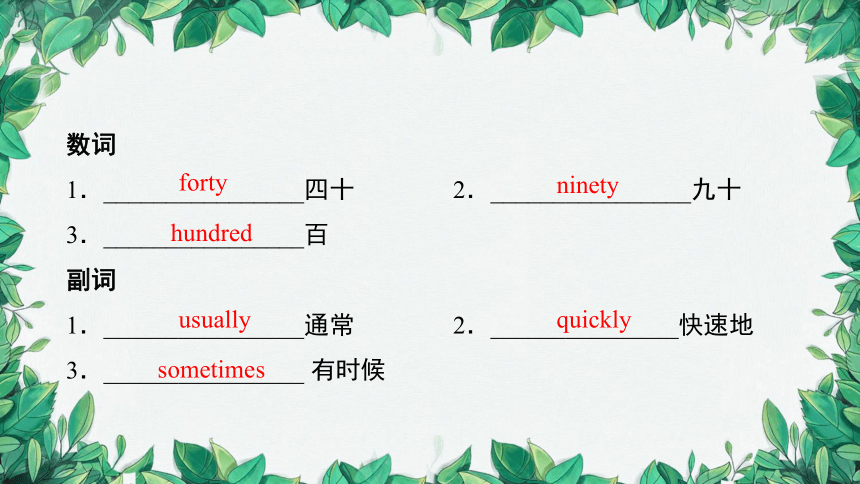
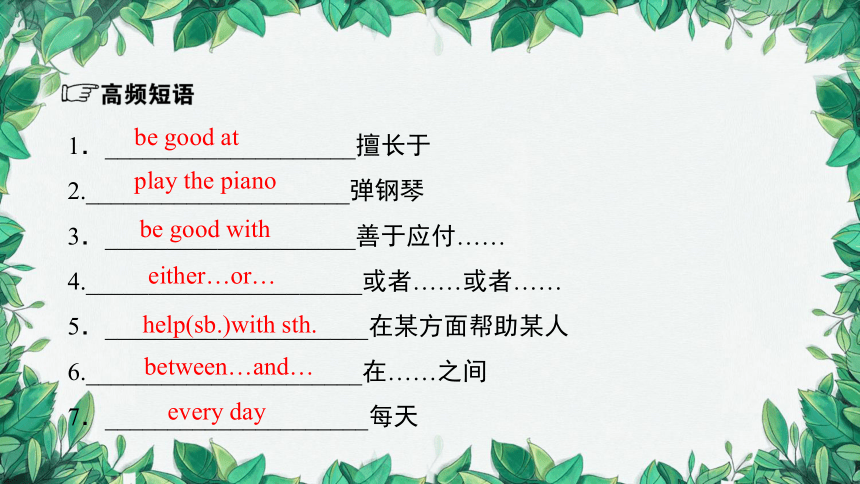
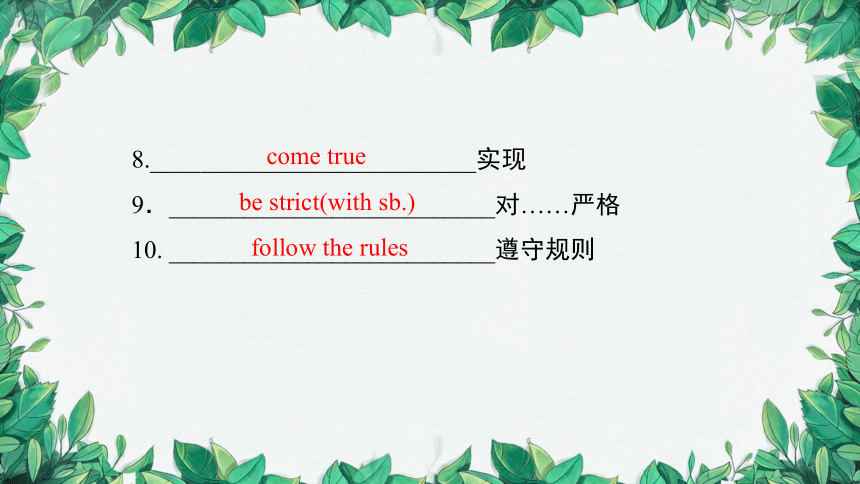

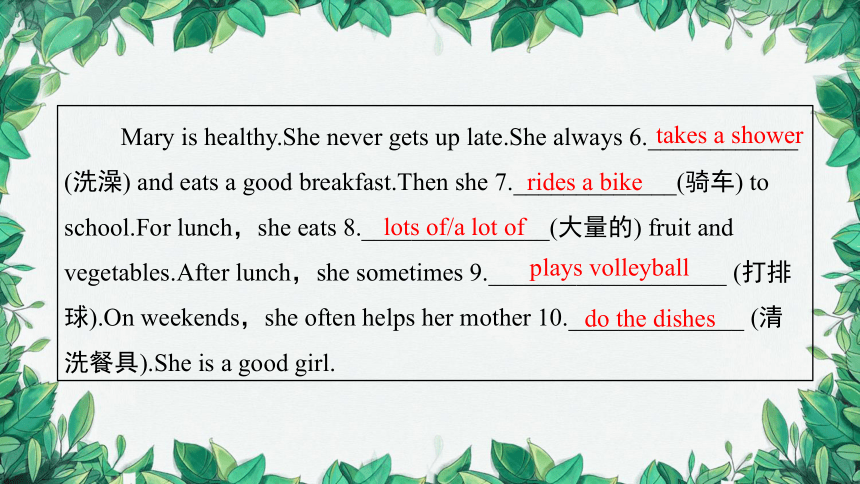
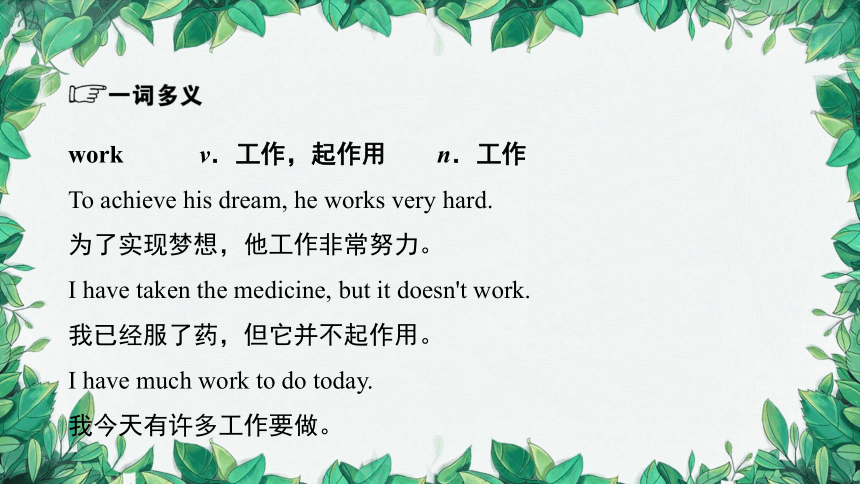
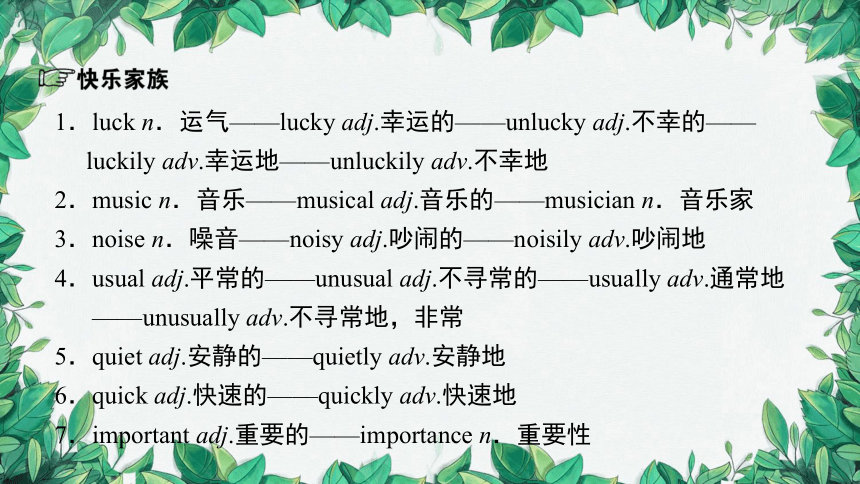
文档简介
(共37张PPT)
教材重难点梳理
专题一 名词
1
单元概览
2
知识梳理
3
重难点突破
4
备考演练
七年级(下) Units 1-4
单元 标题 话题 语法
1 Can you play the guitar? 个人情况 情态动词can的用法
2 What time do you go to school? 日常活动 特殊疑问句(what,when) 频率副词的用法
3 How do you get to school? 旅游和交通 特殊疑问句(how,how long,how far)
4 Don't eat in class. 学校 祈使句的用法
名词
1.________________吉他 2.________________音乐家 3.________________分钟 4.________________村庄
5.________________桥 6.________________厨房
guitar
musician
minute
village
bridge
kitchen
动词
1.________________参加,加入 2.________________写 3.________________锻炼 4.________________带来
5.________________练习 6.________________记得
形容词
1.________________早的 2.________________害怕的 3.________________重要的 4.________________安静的
5.________________吵闹的 6.________________糟糕的
join
write
exercise
bring
practice
remember
early
afraid
important
quiet
noisy
terrible
数词
1.________________四十 2.________________九十 3.________________百
副词
1.________________通常 2._______________快速地 3.________________ 有时候
forty
ninety
hundred
usually
quickly
sometimes
1.____________________擅长于 2._____________________弹钢琴
3.____________________善于应付…… 4.______________________或者……或者……
5._____________________在某方面帮助某人 6.______________________在……之间
7._____________________每天
be good at
play the piano
be good with
either…or…
help(sb.)with sth.
between…and…
every day
8.__________________________实现
9.__________________________对……严格 10. __________________________遵守规则
come true
be strict(with sb.)
follow the rules
精彩段落
经典背诵(根据中文提示完成短文,然后背诵文章)
Tony and Mary are brother and sister,but they have different life habits.
Tony is unhealthy.He doesn't 1.________ (起床) early in the morning,so he doesn't have much time for breakfast.He likes eating hamburgers for lunch at school.He 2._____________(与……相处好) his classmates.When he 3.___________(回到家) after school,he always 4._________________
(做作业) first.He 5.______________(睡觉) at ten thirty.
get up
is good with
gets home
does his homework
goes to bed
Mary is healthy.She never gets up late.She always 6.____________
(洗澡) and eats a good breakfast.Then she 7._____________(骑车) to school.For lunch,she eats 8._______________(大量的) fruit and vegetables.After lunch,she sometimes 9.___________________ (打排球).On weekends,she often helps her mother 10.______________ (清洗餐具).She is a good girl.
takes a shower
rides a bike
lots of/a lot of
plays volleyball
do the dishes
work v.工作,起作用 n.工作
To achieve his dream, he works very hard. 为了实现梦想,他工作非常努力。
I have taken the medicine, but it doesn't work. 我已经服了药,但它并不起作用。
I have much work to do today.
我今天有许多工作要做。
1.luck n.运气——lucky adj.幸运的——unlucky adj.不幸的——
luckily adv.幸运地——unluckily adv.不幸地
2.music n.音乐——musical adj.音乐的——musician n.音乐家
3.noise n.噪音——noisy adj.吵闹的——noisily adv.吵闹地
4.usual adj.平常的——unusual adj.不寻常的——usually adv.通常地
——unusually adv.不寻常地,非常
5.quiet adj.安静的——quietly adv.安静地
6.quick adj.快速的——quickly adv.快速地
7.important adj.重要的——importance n.重要性
1.情态单词can 的用法
表示能力(如体力和脑力方面),意为“能,会”等。
表示请求或允许,多用在口语中,意为“可以,能”等。
表示推测或可能性,意为“可能”,常用于否定句或问句,它的否定式can't 意为“不可能”。
can 的过去式为could,但是Could you tell me…? 中的could是委婉的说法。
(1)Could you tell me how he ____________(get) to school every day
(2)I ____________(can) swim when I was five.
gets
could
2.speak,talk,say & tell的用法及区别
speak(spoke spoken):
(1)作及物动词时,后接某种语言,意为“说,讲……语言”。
(2)speak to sb.对某人说话
talk:意为“讲”“说话”“谈话”;固定搭配: talk to/with sb.和某人交谈;
talk about sth.谈论某事。
say(said said):一般着重讲话的内容,say to sb.对某人说;
say sth.in English 用英语说某物。
tell(told told):常用作及物动词,带双宾语,tell sb.sth.= tell sth.to sb.;
tell a story讲故事; tell a joke讲笑话,tell a lie说谎;
tell the truth说真话。
(1)Can you ____________ English Can you ________it in English
(2)I don't know what you are ______________ about.But I think we can't __________ a lie.
speak
say
talking
tell
3.bring,take,carry和fetch的区别
bring(brought brought):v.意为“带来,拿来”,从别处带到说话人的地点。
take(took taken):v.意为“带去,拿去”,从说话人的地方拿走。
carry:v.指“携带”,有“扛,提,运”的意思。
fetch:v.意为“去拿来, 去取”,相当于 go and bring sth.。
(1)Please remember to ___________ your homework here tomorrow.
(2)You'd better ___________ an umbrella with you in case it rains tomorrow.
bring
take
4.too many,too much 和much too的区别
too many: 意为“太多”,后接可数名词复数。
too much:意为“太多”,后接不可数名词。
much too:意为“太”,后接形容词或副词。
(1)She thinks the school life is boring because she has_______________ subjects to learn and _________________ homework to do.
(2)It's ________________cold here in winter.I don't like living in this city.
too many
too much
much too
5.be good+介词的用法
be good with sb.= get on well with sb.意为“与某人相处好”;
be good at = do well in意为“擅长于”;
be good for 意为“对……有益”,反义词组为be bad for ;
be good to sb.= be kind to sb.意为“对某人友好”。
(1)Tina works hard at school and she ____________ schoolwork.
(2)My parents educate me to _________________ the old people.
is good at
be good to
6.work & job的区别
work和job都有“工作”之意,但job是可数名词,侧重指“职业”,work是不可数名词,侧重指“工作任务”,work也可作动词。
(1)Tom has an interesting _______.He _____________ on a farm.
(2)He has much _____________ to do.
job
works
work
7.exercise的用法
作不可数名词,意为“锻炼,运动”。I like doing exercise in the afternoon.(我喜欢下午做运动。)
作可数名词,意为“练习,习题,体操,功课,操练”等,常用复数。It's important to do some eye exercises.(做眼保健操很重要。) I'm doing my English exercises.(我在做英语习题。)
作动词,意为“训练,锻炼”。You must exercise yourself in order to be stronger and healthier. (为了更健康更强壮,你必须锻炼自己。)
(1)Doing morning ___________ can help us keep in good health.
(2)Please finish all the _____________ on Page 30 on time.
(3)You don't ___________ enough so you always get sick easily.
exercise
exercises
exercise
8.also,too,as well,either “也”
also:用于肯定句中,置于实义动词之前,be动词、助动词或情态动
词之后。
too:放在肯定句句末,前面常有逗号。
as well:放在句尾。
either:放在否定句句末,前面常有逗号。
(1)He is a student.I'm ________ a student.
(2)She doesn't want to move to Paris.I don't want to go there,______.
also
either
9.either与neither的用法
either…or…意为“要么……要么……”(就近原则)
neither…nor…意为“既不……也不……”(就近原则)
either意为“两者中的任一个”。either of…意为作主语时,谓语动词用单数。
neither意为“两者都不”。 neither of…作主语时,谓语动词用单数。反义词为both。
both…and…意为“两者都……”(谓语动词用复数)
—When shall we go to Hong Kong for vacation
—I'm not sure yet.__________this Sunday _________ next Saturday is OK.
Either
or
10.乘坐交通工具的方式
take+a(the)+交通工具(take the bus)
by+交通工具(by bike)
go to…on foot=walk to… 意为“走路去……”
on a/the/one's bike/bus/train/subway
in a/the/one's car/taxi/plane(可以理解为“只能坐着,不能站着”的用词)
(1)He usually __________a bus to school in the morning.
(2)My cousin went to the beach ________ his car.
takes
in
11.get to,arrive in/at,reach的区别
get to:意为“到达”,get是不及物动词,后接表示地点的名词时要与
介词to 连用,即“get to+ 地点”。
arrive:意为“到达”,不及物动词,后接地点名词要借助介词in/at,
即“arrive in+大地方,arrive at+小地点”。
reach:表“到达”,及物动词,后面直接接表示地点的词,即“reach+
地点”。
(get,arrive 后接表示地点的副词,如here,there,home等,不需要任何的介词为媒介;到达的地点没有出现时,只能单独使用arrive。)
(1)As soon as he arrived ________ Kunming, he fell in love with it.
(2)When you ___________, please tell me and I will meet you at the airport.
in
arrive
12.how often,how long,how soon,how far的区别
how often:用来提问频率,意为“多久一次”,常用once,twice,often,
usually,sometimes,never 等回答。
how long:用来提问时间,意为“多久”,回答常用“for+时间段”。
how soon:用来提问做完某事还需要多长时间,意为“多久将会……”,
常用于一般将来时, 常用“in+时间段”来回答。
how far:用来提问距离,意为“多远”。
(1)—_______________ does it take you to go to school
—It takes me about 10 minutes.
(2)—_______________ is the hospital
—It's ten minutes' bus ride.
(3)—_______________ will you be back
—In 2 days.
How long
How far
How soon
一、语法选择。(建议用时:6分钟)
A wise man was on his long journey with a young man. In the evening, they found __1__ small old house. A poor family lived in it. After the meal, the wise man asked how they made a living in such a poor place. In a low voice, the husband replied, “We have a cow. We __2__ her for five years. We sell her milk to our neighbors and keep some for our own needs.”
( )1.A.a B.an C.the
( )2.A.kept B.was keeping C.have kept
A
C
The next morning, the two visitors continued their journey. After they walked a few miles, the wise man told the young man __3__ back and kill the cow. “If __4__ still keep the cow, they will never be rich.” the wise man said. The young man was __5__ about the future of the family. __6__ finally he returned to the old house and did as the wise man told him.
( )3.A.go B.to go C.going
( )4.A.their B.they C.them
( )5.A.worry B.worried C.worriedly
( )6.A.But B.Or C.So
B
B
B
A
A few years later, the young man __7__ travelled on the same road decided to visit the family. __8__ his surprise, he saw a large house with a beautiful garden there.
( )7.A.which B.who C.where
( )8.A.To B.For C.By
B
A
He knocked on the door and a well dressed man answered it. The man told him how his family's life changed. “You know, we had __9__ but a cow to keep us alive years ago. But one day she __10__. We had to come up with new ways of making a living. You see, we are much better than before.” After hearing his words, the young man smiled.
( )9.A.something B. everything C.nothing
( )10.A.kills B.killed C.was killed
C
C
二、短文填空。(建议用时:8分钟)
Two horses that helped save a boy from drowning(溺水) died after days of high fever. It was reported by Cai Liangxing, a coach in a horse riding club in Fujian.
Cai rode along the beach with his two friends. Suddenly, they __11__ someone crying for help. “We found a __12__ had been swept about 300 meters from the beach by the waves,” Cai said. “So we rode into the sea in the direction of the boy.” Luckily, they arrived at the boy's location(位置) quickly with the __13__ of the horses. They used a swimming ring borrowed __14__ a tourist and swam back to the beach. The boy was safe, and then Cai and his friends left after having __15__ short rest.
11. _____________ 12. _____________ 13. ____________
14. _____________ 15. _____________
heard/found
boy
help
from
a
__16__, about a week later, two of the three horses developed a fever. “At first I thought they just had a cold so I didn't __17__ much attention, but later their conditions got worse,” Cai said. __18__ some professional groups came and tried to save their lives, the two horses still died. “They were almost the best horses in our club,” Cai said. “It's a pity to lose __19__.”
16.________________ 17. ________________
18. ________________ 19. ________________
However/Unluckily
pay
Although/Though
them
The boy's parents visited the club to express their thanks. “Nothing is more __20__ than human life,” Cai added. “I will never regret rushing into the sea.”
20. ___________
important
三、小作文操练。
社区的志愿者俱乐部正招募中学生帮助福利院的孩子们学习体育,音乐和英语。假如你是迈克(Mike),请你用4~6句话介绍你的个人情况,包括年龄,就读学校以及你所擅长的技能等。
________________________________________________________________________________________________________________________________________________________________________________________________________________________________________________
My name is Mike and I'm a 14 -year- old boy.Now I'm studying in No.1 Middle School.I am good at speaking English and playing football.What's more, I like children and I really want to help them.I hope I can get the chance.
教材重难点梳理
专题一 名词
1
单元概览
2
知识梳理
3
重难点突破
4
备考演练
七年级(下) Units 1-4
单元 标题 话题 语法
1 Can you play the guitar? 个人情况 情态动词can的用法
2 What time do you go to school? 日常活动 特殊疑问句(what,when) 频率副词的用法
3 How do you get to school? 旅游和交通 特殊疑问句(how,how long,how far)
4 Don't eat in class. 学校 祈使句的用法
名词
1.________________吉他 2.________________音乐家 3.________________分钟 4.________________村庄
5.________________桥 6.________________厨房
guitar
musician
minute
village
bridge
kitchen
动词
1.________________参加,加入 2.________________写 3.________________锻炼 4.________________带来
5.________________练习 6.________________记得
形容词
1.________________早的 2.________________害怕的 3.________________重要的 4.________________安静的
5.________________吵闹的 6.________________糟糕的
join
write
exercise
bring
practice
remember
early
afraid
important
quiet
noisy
terrible
数词
1.________________四十 2.________________九十 3.________________百
副词
1.________________通常 2._______________快速地 3.________________ 有时候
forty
ninety
hundred
usually
quickly
sometimes
1.____________________擅长于 2._____________________弹钢琴
3.____________________善于应付…… 4.______________________或者……或者……
5._____________________在某方面帮助某人 6.______________________在……之间
7._____________________每天
be good at
play the piano
be good with
either…or…
help(sb.)with sth.
between…and…
every day
8.__________________________实现
9.__________________________对……严格 10. __________________________遵守规则
come true
be strict(with sb.)
follow the rules
精彩段落
经典背诵(根据中文提示完成短文,然后背诵文章)
Tony and Mary are brother and sister,but they have different life habits.
Tony is unhealthy.He doesn't 1.________ (起床) early in the morning,so he doesn't have much time for breakfast.He likes eating hamburgers for lunch at school.He 2._____________(与……相处好) his classmates.When he 3.___________(回到家) after school,he always 4._________________
(做作业) first.He 5.______________(睡觉) at ten thirty.
get up
is good with
gets home
does his homework
goes to bed
Mary is healthy.She never gets up late.She always 6.____________
(洗澡) and eats a good breakfast.Then she 7._____________(骑车) to school.For lunch,she eats 8._______________(大量的) fruit and vegetables.After lunch,she sometimes 9.___________________ (打排球).On weekends,she often helps her mother 10.______________ (清洗餐具).She is a good girl.
takes a shower
rides a bike
lots of/a lot of
plays volleyball
do the dishes
work v.工作,起作用 n.工作
To achieve his dream, he works very hard. 为了实现梦想,他工作非常努力。
I have taken the medicine, but it doesn't work. 我已经服了药,但它并不起作用。
I have much work to do today.
我今天有许多工作要做。
1.luck n.运气——lucky adj.幸运的——unlucky adj.不幸的——
luckily adv.幸运地——unluckily adv.不幸地
2.music n.音乐——musical adj.音乐的——musician n.音乐家
3.noise n.噪音——noisy adj.吵闹的——noisily adv.吵闹地
4.usual adj.平常的——unusual adj.不寻常的——usually adv.通常地
——unusually adv.不寻常地,非常
5.quiet adj.安静的——quietly adv.安静地
6.quick adj.快速的——quickly adv.快速地
7.important adj.重要的——importance n.重要性
1.情态单词can 的用法
表示能力(如体力和脑力方面),意为“能,会”等。
表示请求或允许,多用在口语中,意为“可以,能”等。
表示推测或可能性,意为“可能”,常用于否定句或问句,它的否定式can't 意为“不可能”。
can 的过去式为could,但是Could you tell me…? 中的could是委婉的说法。
(1)Could you tell me how he ____________(get) to school every day
(2)I ____________(can) swim when I was five.
gets
could
2.speak,talk,say & tell的用法及区别
speak(spoke spoken):
(1)作及物动词时,后接某种语言,意为“说,讲……语言”。
(2)speak to sb.对某人说话
talk:意为“讲”“说话”“谈话”;固定搭配: talk to/with sb.和某人交谈;
talk about sth.谈论某事。
say(said said):一般着重讲话的内容,say to sb.对某人说;
say sth.in English 用英语说某物。
tell(told told):常用作及物动词,带双宾语,tell sb.sth.= tell sth.to sb.;
tell a story讲故事; tell a joke讲笑话,tell a lie说谎;
tell the truth说真话。
(1)Can you ____________ English Can you ________it in English
(2)I don't know what you are ______________ about.But I think we can't __________ a lie.
speak
say
talking
tell
3.bring,take,carry和fetch的区别
bring(brought brought):v.意为“带来,拿来”,从别处带到说话人的地点。
take(took taken):v.意为“带去,拿去”,从说话人的地方拿走。
carry:v.指“携带”,有“扛,提,运”的意思。
fetch:v.意为“去拿来, 去取”,相当于 go and bring sth.。
(1)Please remember to ___________ your homework here tomorrow.
(2)You'd better ___________ an umbrella with you in case it rains tomorrow.
bring
take
4.too many,too much 和much too的区别
too many: 意为“太多”,后接可数名词复数。
too much:意为“太多”,后接不可数名词。
much too:意为“太”,后接形容词或副词。
(1)She thinks the school life is boring because she has_______________ subjects to learn and _________________ homework to do.
(2)It's ________________cold here in winter.I don't like living in this city.
too many
too much
much too
5.be good+介词的用法
be good with sb.= get on well with sb.意为“与某人相处好”;
be good at = do well in意为“擅长于”;
be good for 意为“对……有益”,反义词组为be bad for ;
be good to sb.= be kind to sb.意为“对某人友好”。
(1)Tina works hard at school and she ____________ schoolwork.
(2)My parents educate me to _________________ the old people.
is good at
be good to
6.work & job的区别
work和job都有“工作”之意,但job是可数名词,侧重指“职业”,work是不可数名词,侧重指“工作任务”,work也可作动词。
(1)Tom has an interesting _______.He _____________ on a farm.
(2)He has much _____________ to do.
job
works
work
7.exercise的用法
作不可数名词,意为“锻炼,运动”。I like doing exercise in the afternoon.(我喜欢下午做运动。)
作可数名词,意为“练习,习题,体操,功课,操练”等,常用复数。It's important to do some eye exercises.(做眼保健操很重要。) I'm doing my English exercises.(我在做英语习题。)
作动词,意为“训练,锻炼”。You must exercise yourself in order to be stronger and healthier. (为了更健康更强壮,你必须锻炼自己。)
(1)Doing morning ___________ can help us keep in good health.
(2)Please finish all the _____________ on Page 30 on time.
(3)You don't ___________ enough so you always get sick easily.
exercise
exercises
exercise
8.also,too,as well,either “也”
also:用于肯定句中,置于实义动词之前,be动词、助动词或情态动
词之后。
too:放在肯定句句末,前面常有逗号。
as well:放在句尾。
either:放在否定句句末,前面常有逗号。
(1)He is a student.I'm ________ a student.
(2)She doesn't want to move to Paris.I don't want to go there,______.
also
either
9.either与neither的用法
either…or…意为“要么……要么……”(就近原则)
neither…nor…意为“既不……也不……”(就近原则)
either意为“两者中的任一个”。either of…意为作主语时,谓语动词用单数。
neither意为“两者都不”。 neither of…作主语时,谓语动词用单数。反义词为both。
both…and…意为“两者都……”(谓语动词用复数)
—When shall we go to Hong Kong for vacation
—I'm not sure yet.__________this Sunday _________ next Saturday is OK.
Either
or
10.乘坐交通工具的方式
take+a(the)+交通工具(take the bus)
by+交通工具(by bike)
go to…on foot=walk to… 意为“走路去……”
on a/the/one's bike/bus/train/subway
in a/the/one's car/taxi/plane(可以理解为“只能坐着,不能站着”的用词)
(1)He usually __________a bus to school in the morning.
(2)My cousin went to the beach ________ his car.
takes
in
11.get to,arrive in/at,reach的区别
get to:意为“到达”,get是不及物动词,后接表示地点的名词时要与
介词to 连用,即“get to+ 地点”。
arrive:意为“到达”,不及物动词,后接地点名词要借助介词in/at,
即“arrive in+大地方,arrive at+小地点”。
reach:表“到达”,及物动词,后面直接接表示地点的词,即“reach+
地点”。
(get,arrive 后接表示地点的副词,如here,there,home等,不需要任何的介词为媒介;到达的地点没有出现时,只能单独使用arrive。)
(1)As soon as he arrived ________ Kunming, he fell in love with it.
(2)When you ___________, please tell me and I will meet you at the airport.
in
arrive
12.how often,how long,how soon,how far的区别
how often:用来提问频率,意为“多久一次”,常用once,twice,often,
usually,sometimes,never 等回答。
how long:用来提问时间,意为“多久”,回答常用“for+时间段”。
how soon:用来提问做完某事还需要多长时间,意为“多久将会……”,
常用于一般将来时, 常用“in+时间段”来回答。
how far:用来提问距离,意为“多远”。
(1)—_______________ does it take you to go to school
—It takes me about 10 minutes.
(2)—_______________ is the hospital
—It's ten minutes' bus ride.
(3)—_______________ will you be back
—In 2 days.
How long
How far
How soon
一、语法选择。(建议用时:6分钟)
A wise man was on his long journey with a young man. In the evening, they found __1__ small old house. A poor family lived in it. After the meal, the wise man asked how they made a living in such a poor place. In a low voice, the husband replied, “We have a cow. We __2__ her for five years. We sell her milk to our neighbors and keep some for our own needs.”
( )1.A.a B.an C.the
( )2.A.kept B.was keeping C.have kept
A
C
The next morning, the two visitors continued their journey. After they walked a few miles, the wise man told the young man __3__ back and kill the cow. “If __4__ still keep the cow, they will never be rich.” the wise man said. The young man was __5__ about the future of the family. __6__ finally he returned to the old house and did as the wise man told him.
( )3.A.go B.to go C.going
( )4.A.their B.they C.them
( )5.A.worry B.worried C.worriedly
( )6.A.But B.Or C.So
B
B
B
A
A few years later, the young man __7__ travelled on the same road decided to visit the family. __8__ his surprise, he saw a large house with a beautiful garden there.
( )7.A.which B.who C.where
( )8.A.To B.For C.By
B
A
He knocked on the door and a well dressed man answered it. The man told him how his family's life changed. “You know, we had __9__ but a cow to keep us alive years ago. But one day she __10__. We had to come up with new ways of making a living. You see, we are much better than before.” After hearing his words, the young man smiled.
( )9.A.something B. everything C.nothing
( )10.A.kills B.killed C.was killed
C
C
二、短文填空。(建议用时:8分钟)
Two horses that helped save a boy from drowning(溺水) died after days of high fever. It was reported by Cai Liangxing, a coach in a horse riding club in Fujian.
Cai rode along the beach with his two friends. Suddenly, they __11__ someone crying for help. “We found a __12__ had been swept about 300 meters from the beach by the waves,” Cai said. “So we rode into the sea in the direction of the boy.” Luckily, they arrived at the boy's location(位置) quickly with the __13__ of the horses. They used a swimming ring borrowed __14__ a tourist and swam back to the beach. The boy was safe, and then Cai and his friends left after having __15__ short rest.
11. _____________ 12. _____________ 13. ____________
14. _____________ 15. _____________
heard/found
boy
help
from
a
__16__, about a week later, two of the three horses developed a fever. “At first I thought they just had a cold so I didn't __17__ much attention, but later their conditions got worse,” Cai said. __18__ some professional groups came and tried to save their lives, the two horses still died. “They were almost the best horses in our club,” Cai said. “It's a pity to lose __19__.”
16.________________ 17. ________________
18. ________________ 19. ________________
However/Unluckily
pay
Although/Though
them
The boy's parents visited the club to express their thanks. “Nothing is more __20__ than human life,” Cai added. “I will never regret rushing into the sea.”
20. ___________
important
三、小作文操练。
社区的志愿者俱乐部正招募中学生帮助福利院的孩子们学习体育,音乐和英语。假如你是迈克(Mike),请你用4~6句话介绍你的个人情况,包括年龄,就读学校以及你所擅长的技能等。
________________________________________________________________________________________________________________________________________________________________________________________________________________________________________________
My name is Mike and I'm a 14 -year- old boy.Now I'm studying in No.1 Middle School.I am good at speaking English and playing football.What's more, I like children and I really want to help them.I hope I can get the chance.
